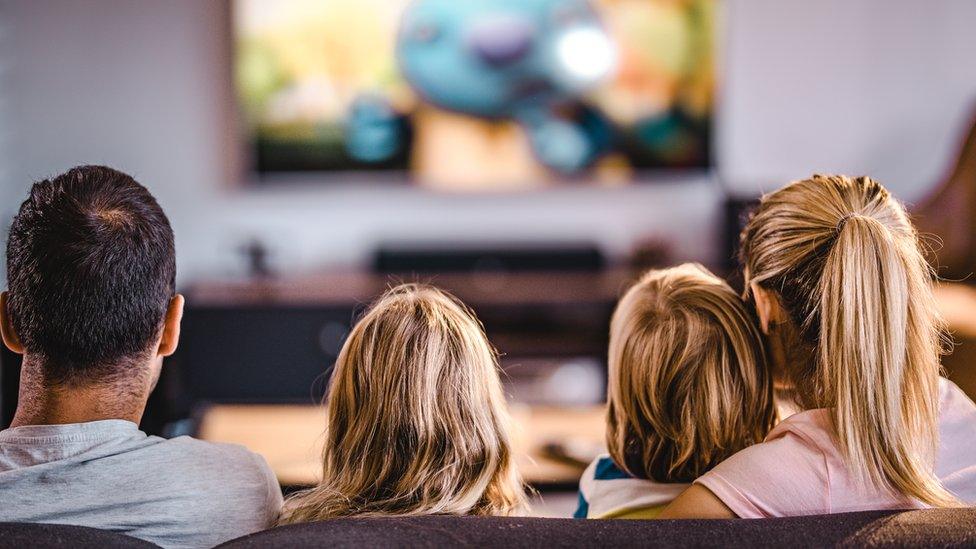Coronavirus and a media paradox
- Published

Families self-isolating at home have led to soaring ratings for broadcasters and news services
It's obviously not the most important thing happening right now, but with millions of people working from home, ratings for television channels and streaming services are soaring.
Presumably radio figures are massively up too, but they're harder and slower to measure.
Demand for news and entertainment is surging. It's not just the BBC. In news terms, ITV and Channel 4 News are seeing both the sort of absolute numbers and audience shares that, in normal times, they would dream of.
But there are a couple of paradoxes here.
The first is that though demand is surging, it is going to get harder and harder, and harder and harder, to supply fresh material to meet that demand.
ITV has now suspended Coronation Street and Emmerdale. The BBC had already suspended Eastenders, Peaky Blinders, Line of Duty, Casualty, Holby City and many others.
Netflix has suspended all productions across the globe, which is of course unprecedented.
Consider the freelancers
It is impossible to overstate the anguish and turmoil this will cause for members of an industry which is largely staffed by freelancers on short-term contracts. With no job security, and no other productions to turn to because of the far-reaching consequences of the virus, this will cause widespread immiseration.
Until the virus struck, the creative industries in Britain and much of the globe were a fast-growth sector. That is, they were generally growing at a faster clip than most of the national economies they are embedded in.
The creative industries isn't primarily made up of famous actors and singers and artists. It is made up primarily of producers, engineers, runners, admin staff and countless other less glamorous roles, all of them decimated.
In the can - or not, as the case may be
Not knowing how long productions are down, schedulers are currently having a nightmare in trying to work out how many repeats they will need to mobilise.
Most soaps shoot around five to six weeks ahead of time, so should have material in the can, as the saying goes, until just before May. But some of that material may be wildly inappropriate: shot in a pub, say, as in Eastenders; and certainly not full of people standing two metres apart.
Those watching at home will have to be savvy enough to remember they're not watching live drama unfold, but stuff filmed weeks ago. I can already see the uproar on Twitter when, a few weeks from now, one of these soaps shows whole groups of people in close proximity.
On big budget dramas, most of those that were going to be broadcast over the spring or summer are similarly in the can. It's going to be this autumn and winter when suddenly, on Sunday night at 9pm, an old series is brought back, in a slot initially intended for a new one.
later this evening.

A SIMPLE GUIDE: What are the symptoms?
AVOIDING CONTACT: Should I self-isolate?
LOOK-UP TOOL: Check cases in your area
MAPS AND CHARTS: Visual guide to the outbreak

Fortunately, the archives are stuffed with gold.
In heroic circumstances, news operations - staffed by key workers - are still managing to get most of their output to air. But the strain in coming weeks is impossible to predict. And as for the vast chasms in this summer's schedules left by the collapse of sporting events, it's too early to know how they will be filled.
As supplying the public thirst for fresh or live material gets tougher, so the reliance on repeats - artfully characterised as "old classics" - will grow.
When ratings don't turn into revenue
There is a second paradox at work here. Aside from the BBC, Britain's terrestrial broadcasters are commercial beasts, funded by advertising. Their pursuit of ratings is driven by a causal connection between higher ratings and higher revenues, which in turn can be used to fund stronger programming, which leads to higher ratings, and so on.
Coronavirus has decimated that virtuous circle. It will vary between broadcasters, and according to time schedules, but right now higher ratings are not converting into higher revenues.
ITV has given advance notice that its revenues will be ten per cent down in April, as travel companies delay their spring campaigns.
For most companies, advertising or marketing is a discretionary spend. Of course you probably need to do it, to get your message out and arouse interest, but you don't have to pay for it in the way you have to pay your fixed costs such as rent or staffing. Therefore in an economic downturn, advertising is one of the first things to go.
A ten per cent drop in a single month is devastating. For the likes of ITV, Channel 4 and Channel 5, such hits will create deficits in their budgets that, sadly, could radically cut how much they can spend on future programmes, and might conceivably lead to their being put up for sale.
The lucky BBC
BBC staff are exceptionally fortunate in not being driven by the same commercial imperatives.
That said, Coronavirus will create a huge dent in the BBC's budget. The Corporation is funding the two-month delay to changes for which over-75s get free TV Licences. That will probably cost £80m at least.
And other proposed savings programmes, including a major reorganisation of BBC News, have to be delayed in this crisis period.
In other ways - and this is obviously not the most important thing for people worried about their families' health - it would be remiss to overlook that fact that the virus does present all public service broadcasters with a chance to show their mettle and their worth.
Not so long ago, No 10 was briefing that the BBC would be "whacked." That is no longer a No 10 priority. Today, to some degree the government and all public service broadcasters are aligned in one particular motive, which is getting clear information to the public.
With soaring ratings and traffic for news programmes and websites respectively, No 10 can be grateful that people are turning to our public service broadcasters for trusted information.
This crisis will also - hopefully - make the infantile demand that the BBC "should be more like Netflix" a thing of the past. Netflix is one of the world's best companies today; but nobody is turning to Netflix to watch live press conferences, or have their questions about Coronavirus answered by experts, or see the latest on, say, Italy's lockdown.
The impact of Coronavirus on the search for the next director general of the BBC is hard to guess. A tough negotiator was one of the primary attributes sought for before this crisis. That will still be the case after the crisis (whenever that may be), but whoever gets the job may now have a marginally easier time making the case for the BBC to No 10.
I think it's important to point out that, in exceptionally tough circumstances, all of Britain's public service broadcasters are doing an outstanding job in informing, educating and entertaining the UK population. For a while, it will get exponentially tougher to do so.
We talk a lot these days about how modern and social media drive people apart, increasing polarisation and so on. In the coming months, traditional media - linear TV and radio - will play a vital role in bringing the nation together.
If you're interested in issues such as these, please follow me on Twitter, external or Facebook, external; and also please subscribe to The Media Show podcast, external from Radio 4. I'm grateful for all constructive feedback. Thanks.
